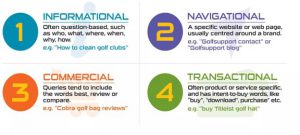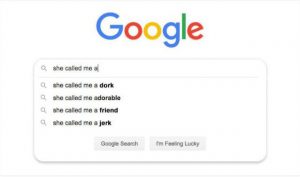Search Intent – Why is it important for SEO?
Search engine optimization is about far more than just picking a few keywords and sprinklin' them into your content. If you want to get the most out of optimization and achieve the best results with the time you put in, search intent is critical.

Search engine optimization is about far more than just picking a few keywords and sprinklin’ them into your content. If you want to get the most out of optimization and achieve the best results with the time you put in, search intent is critical. If you want to have a career in marketing knowing what your customers search for online is key. Also known as user intent, this specific optimization component is a cornerstone to getting your website in front of the right people.
What makes search intent so vitally important to your optimization plans? Glad you asked. Read on to find out more about what search intent is, why it’s so important, and what types of search intent are out there now:
What is search intent?
When you look up something on a search engine, you intend to find specific information or a particular business. Search intent is a term that describes this process – the main goal that the individual has when searching a particular term or want. A search query made by a person always has a reason. The motivation behind searching for that specific thing, whether it’s ‘quick dinner recipes’ or ‘shoe shops open now near me,’ is to find information or a service.

Image from – www.rebootonline.com
Over the years, Google has tipped its search engine more and more in favour of search query intent. That means they want to offer a better user experience to their visitors by helping them find the specific website, product, or information they want as quickly and intuitively as possible. So when it comes to finding your particular website, search intent is a vital consideration if you want to get qualified, relevant visitors to your website.
Why should I optimize my content for search intent?
You should optimize your content for search intent because it doesn’t make sense not to. I mean, you’ve got more to gain, less to lose. If you’re failing to use keyword intent and climb search engine rankings, you may want to consider playing by Google’s rules. As of right now, Google considers search intent a vital part of how they rate websites. No search intent optimization? Then you may be at the bottom of the pile before you know it. Optimizing your website to match your potential customers’ search intent not only gets your head and shoulders above the competition, but it helps to provide your customers with exactly what they’re looking for.
Why is search intent important?
Search intent is, in part, important because Google considers it important. But even without looking at the nuts and bolts of the algorithms that Google favours, optimizing your website for search intent is good practice. You want your visitors to be able to find what they want quickly and easily. That’s simply good customer service. With a platform that’s optimized for search intent, you’re providing your audience exactly what they want, when they want it, without the need to dig for information or search for products. It’s better for your rankings, and it’s better for your potential customers too.
Four types
Now that you’ve got an idea about what makes search intent so important let’s take a closer look at the different search intent types that are out there. While there are more obscure forms of search intent out there, the four most common versions you’re likely to encounter are as follows:
Informational intent
As the name may suggest to you, informational intent refers to the overwhelming most common type of search we all make. Any search query related to gathering information on a topic or subject is informational search intent. Generally, these types of queries are to find an answer to a specific question. Whether that question is ‘what material are socks made of?’ or ‘how tall is the queen of England?‘, the results are the same. The user looks for information to answer their question, and the search results provide that answer.

Navigational intent
In contrast to informational search, navigational intent refers to any search that has a specific purpose. For example, a user is seeking to find a specific brand or webpage. The search is designed to help the person find something specific, such as a ‘chest of drawers in white from IKEA.’ The searcher knows they want to find a chest of drawers, they want them to be white, and they want them from IKEA. The search results reflect this, giving a link to that specific brand and those particular products.
Transactional intent
Anything to do with money can be considered a search with transactional intent. Typically, the words’ cost of‘, ‘price,’ or ‘for sale‘ are included in these searches. They are already ready to buy, and they want easy navigation to the product they want to spend money on. An example of this could be ‘ps5 price,’ or ‘mountain bike for sale.’
Commercial investigation
Commercial investigation searches take transactional and informational search intent and blend them. Users that are not ready to buy a product but want to research it falls under this category. A good example of a commercial investigation search might be someone searching for ‘best baby toys,’ looking at a range of different products, and deciding which one they may want to buy later.
Why is search intent important for keyword research?
Conducting keyword research before understanding search intent is like putting the cart before the horse. As mentioned above, Google greatly values intent as a part of the ranking process. So, when it comes to the keywords you’re considering using on your content, you should also consider what intent your users are likely to have. Are they likely to be looking for easy answers to questions or products they already want to buy? Will they be comparing your products against others in the market or simply looking to navigate to your website specifically? By understanding search intent and including it in your keyword research process, you’re far more likely to be successful in climbing those rankings.
What is the best way to plan a blog post?
The best way to start writing content with search intent in mind is to consider it up-front. Think about why someone might be searching for your content and what else they may want to know because of that search. By nature, blog content often falls under the informational intent category. A user will be looking for an answer to a question or information about something you specialize in. As such, including keywords related to informational intent is a good move. Think ‘how do I change a lightbulb?‘ instead of ‘change lightbulb near me.’ If you consider search intent up-front, your blog content will not only be more valuable – it will be relevant in Google’s eyes, too.
While search intent is often overlooked in basic optimization, focusing on this area of SEO can be far more rewarding than you may expect when done right. If you’d expert advice and professional support for search intent optimization, get in touch with our friends at Panzi Digital Agency.
 Micah Lotemo is the founder and CEO of Panzi Digital Agency, a boutique digital marketing agency based in Atlanta. He is a passionate digital marketer, an Acadium Plus graduate, and an advocate for future-forward technology. When he’s not working you can find him spending time with his wife and 2 daughters or playing some tunes on the guitar.
Micah Lotemo is the founder and CEO of Panzi Digital Agency, a boutique digital marketing agency based in Atlanta. He is a passionate digital marketer, an Acadium Plus graduate, and an advocate for future-forward technology. When he’s not working you can find him spending time with his wife and 2 daughters or playing some tunes on the guitar.
The Acadium Plus program offers an enhanced learning experience for our job-seekers by offering personalized skills development, career coaching and job search support.
Ryan Carruthers is the Content Marketing Manager at Together Software, a company that builds software to help enterprise companies run effective mentorship programs within their organizations. Ryan was an Acadium apprentice and leveraged his apprenticeship experience to get a job at Together.
-
Career Prep
Top Marketing Webinars for Digital Marketers in 2025
By attending these webinars, you will have the opportunity to learn from industry leaders, gain insider knowledge, and stay ahead of the competition.
-
Career Prep, News
9 Types of Digital Marketing to Choose From in 2025
Digital marketing is a dynamic field that offers diverse career opportunities. From search engine optimization to social media marketing, there are many specializations to explore. Whether you're just starting out or looking to switch careers, this guide will help you find your ideal digital marketing niche.

Subscribe to our newsletter for digital marketing resources
Become a better marketer with our digital marketing resources and tips shared weekly in your inbox.

Get started with Acadium
Build your marketing career for free or find marketing talent on any budget — fully remote.

